Data Management With ReductStore
ReductStore provides a set of methods to manage data in the database. This guide provides an overview of typical data management operations in ReductStore and explains how to perform them using the ReductStore SDKs or the HTTP API.
Changing Labels
ReductStore doesn't allow you to change the contents of records, but it does allow you to change the labels of existing records. You can add, remove or update labels for a single record or for a batch of records to avoid HTTP requests overhead.
You should send a label as an empty string to remove it.
- Python
- JavaScript
- Go
- Rust
- C++
- Web Console
- cURL
import time
import asyncio
from reduct import Client, Bucket, Batch
async def main():
# Create a client instance, then get or create a bucket
async with Client("http://127.0.0.1:8383", api_token="my-token") as client:
bucket: Bucket = await client.create_bucket("my-bucket", exist_ok=True)
# Send some records to the "py-example" entry with labels
ts = time.time()
await bucket.write(
"py-example",
b"Some binary data",
ts,
labels={"key1": "value1", "key2": "value2"},
)
await bucket.write(
"py-example",
b"Some binary data",
ts + 1,
labels={"key1": "value1", "key2": "value2"},
)
# Update labels of a record: remove "key2" and update "key1"
await bucket.update("py-example", ts, labels={"key1": "new-value", "key2": ""})
async with bucket.read("py-example", ts) as record:
assert record.labels["key1"] == "new-value"
assert "key2" not in record.labels
# Update labels in a batch
batch = Batch()
batch.add(ts, labels={"key1": "new-value", "key2": ""})
batch.add(ts + 1, labels={"key3": "value3"})
errors = await bucket.update_batch("py-example", batch)
assert not errors
if __name__ == "__main__":
import asyncio
asyncio.run(main())
import { Client } from "reduct-js";
import assert from "node:assert";
// Create a client instance, then get or create a bucket
const client = new Client("http://127.0.0.1:8383", { apiToken: "my-token" });
const bucket = await client.getOrCreateBucket("bucket");
// Send some records to the "entry-1" entry with labels
const timestamp = BigInt(Date.now()) * 1000n;
let record = await bucket.beginWrite("entry-1", {
ts: timestamp,
labels: { key1: "value1", key2: "value2" },
});
await record.write("Some binary data");
record = await bucket.beginWrite("entry-1", {
ts: timestamp + 1000_000n,
labels: { key1: "value1", key2: "value2" },
});
await record.write("Some more binary data");
// Update labels of a record: remove "key2" and update "key1"
await bucket.update("entry-1", timestamp, { key1: "new-value", key2: "" });
record = await bucket.beginRead("entry-1", timestamp, true); // only labels
assert(record.labels["key1"] === "new-value");
assert(record.labels["key2"] === undefined);
// Update labels in a batch
const batch = await bucket.beginUpdateBatch("entry-1");
batch.addOnlyLabels(timestamp, { label1: "value1", label2: "" });
batch.addOnlyLabels(timestamp + 1000_000n, { label3: "value3" });
const errors = await batch.write();
assert(errors.size === 0);
package main
import (
"context"
reduct "github.com/reductstore/reduct-go"
"time"
)
func main() {
// Create a client and use the base URL and API token
client := reduct.NewClient("http://localhost:8383", reduct.ClientOptions{
APIToken: "my-token",
})
// Get or create a bucket with the name "my-bucket"
bucket, err := client.CreateOrGetBucket(context.Background(), "my-bucket", nil)
if err != nil {
panic(err)
}
// Send some records to the "go-example"
ts := time.Now().UnixMicro()
err = bucket.BeginWrite(context.Background(), "go-example", &reduct.WriteOptions{
Timestamp: ts,
}).Write([]byte("Some binary data"))
if err != nil {
panic(err)
}
err = bucket.BeginWrite(context.Background(), "go-example", &reduct.WriteOptions{
Timestamp: ts + 1,
}).Write([]byte("Some binary data"))
if err != nil {
panic(err)
}
// Update labels of a record: remove "key2" and update "key1"
err = bucket.Update(context.Background(), "go-example", ts, map[string]any{"key1": "new-value", "key2": ""})
if err != nil {
panic(err)
}
record, err := bucket.BeginRead(context.Background(), "go-example", &ts)
if err != nil {
panic(err)
}
if record.Labels()["key1"] != "new-value" || record.Labels()["key2"] != nil {
panic("Labels not updated correctly")
}
// Update labels in a batch
batch := bucket.BeginUpdateBatch(context.Background(), "go-example")
batch.AddOnlyLabels(ts, map[string]any{"key1": "new-value", "key2": ""})
batch.AddOnlyLabels(ts+1, map[string]any{"key3": "value3"})
errors, err := batch.Write(context.Background())
if err != nil {
panic(err)
}
if len(errors) != 0 {
panic("Expected no errors, but got " + string(len(errors)))
}
}
use std::time::{Duration, SystemTime};
use bytes::Bytes;
use reduct_rs::{RecordBuilder, ReductClient, ReductError};
use tokio;
#[tokio::main]
async fn main() -> Result<(), ReductError> {
// Create a client instance, then get or create a bucket
let client = ReductClient::builder()
.url("http://127.0.0.1:8383")
.api_token("my-token")
.build();
let bucket = client.create_bucket("test").exist_ok(true).send().await?;
// Send some records to the "rs-example" entry with labels "key1=value1" and "key2=value2
let timestamp = SystemTime::now();
bucket
.write_record("rs-example")
.timestamp(timestamp)
.add_label("key1", "value1")
.add_label("key2", "value2")
.data(Bytes::from("Some binary data"))
.send()
.await?;
bucket
.write_record("rs-example")
.timestamp(timestamp + Duration::from_secs(1))
.add_label("key1", "value1")
.add_label("key2", "value2")
.data(Bytes::from("Some more binary data"))
.send()
.await?;
// Update labels of a record: remove "key2" and update "key1"
bucket
.update_record("rs-example")
.timestamp(timestamp)
.remove_label("key2")
.update_label("key1", "value3")
.send()
.await?;
let record = bucket
.read_record("rs-example")
.timestamp(timestamp)
.send()
.await?;
assert_eq!(record.labels().get("key1"), Some(&"value3".to_string()));
assert_eq!(record.labels().get("key2"), None);
// Update labels in a batch
let record1 = RecordBuilder::new()
.timestamp(timestamp)
.add_label("key1", "value1")
.add_label("key2", "") // Remove label "key2"
.build();
let record2 = RecordBuilder::new()
.timestamp(timestamp + Duration::from_secs(1))
.add_label("key1", "value1")
.add_label("key2", "") // Remove label "key2"
.build();
let errors = bucket
.update_batch("rs-example")
.add_records(vec![record1, record2])
.send()
.await?;
assert_eq!(errors.len(), 0);
Ok(())
}
#include <reduct/client.h>
#include <cassert>
#include <chrono>
using reduct::IBucket;
using reduct::IClient;
using reduct::Error;
using std::chrono_literals::operator ""s;
int main() {
// Create a client instance, then get or create a bucket
auto client = IClient::Build("http://127.0.0.1:8383", {.api_token="my-token"});
auto [bucket, create_err] = client->GetOrCreateBucket("my-bucket");
assert(create_err == Error::kOk);
// Send some records to the "cpp-example" entry with labels
IBucket::Time ts = IBucket::Time::clock::now();
auto err = bucket->Write("cpp-example", {
.timestamp = ts,
.labels = {{"key1", "value1"},
{"key2", "value2"}}
}, [](auto rec) {
rec->WriteAll("Some binary data");
});
assert(err == Error::kOk);
err = bucket->Write("cpp-example", {
.timestamp = ts + 1s,
.labels = {{"key1", "value1"},
{"key2", "value2"}}
}, [](auto rec) {
rec->WriteAll("Some binary data");
});
assert(err == Error::kOk);
// Update labels of a record: remove "key2" and update "key1"
err = bucket->Update("cpp-example", {
.timestamp = ts,
.labels = {{"key1", "value3"},
{"key2", ""}}
});
assert(err == Error::kOk);
err = bucket->Read("cpp-example", ts, [](auto rec) {
assert(rec.labels["key1"] == "value3");
assert(rec.labels["key2"] == "");
return true;
});
assert(err == Error::kOk);
// Update labels in a batch
auto [record_errors, http_err] = bucket->UpdateBatch("cpp-example", [ts](auto batch) {
batch->AddOnlyLabels(ts, {{"key1", "value4"}});
batch->AddOnlyLabels(ts + 1s, {{"key1", "value4"}});
});
assert(http_err == Error::kOk);
assert(record_errors.empty());
return 0;
}
- Open the Web Console at
http://127.0.0.1:8383in your browser. - Enter the API token if the authorization is enabled.
- Select the bucket that contains the data you want to query:
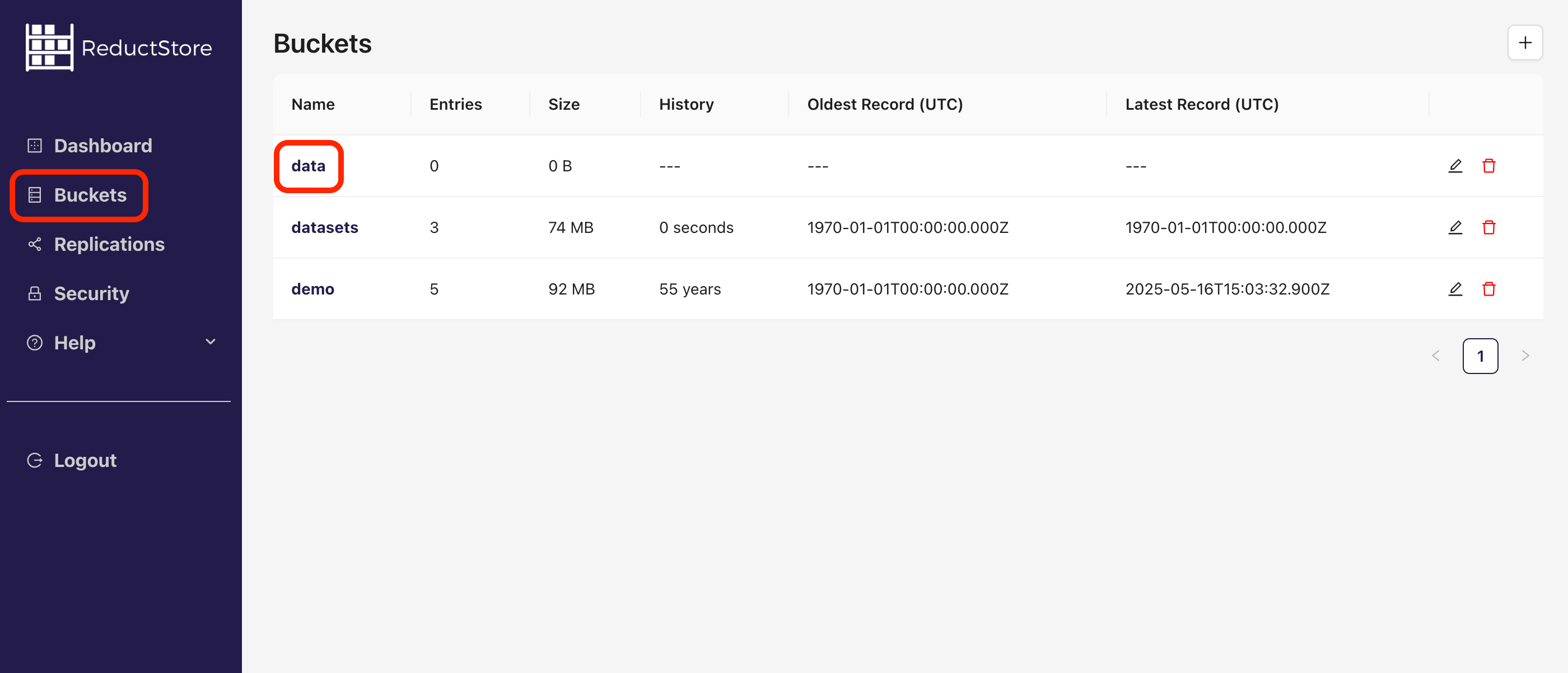
- You will see a list of all the entries in the bucket
- Click on the entry you want to query
- On the entry page you will see the query panel:
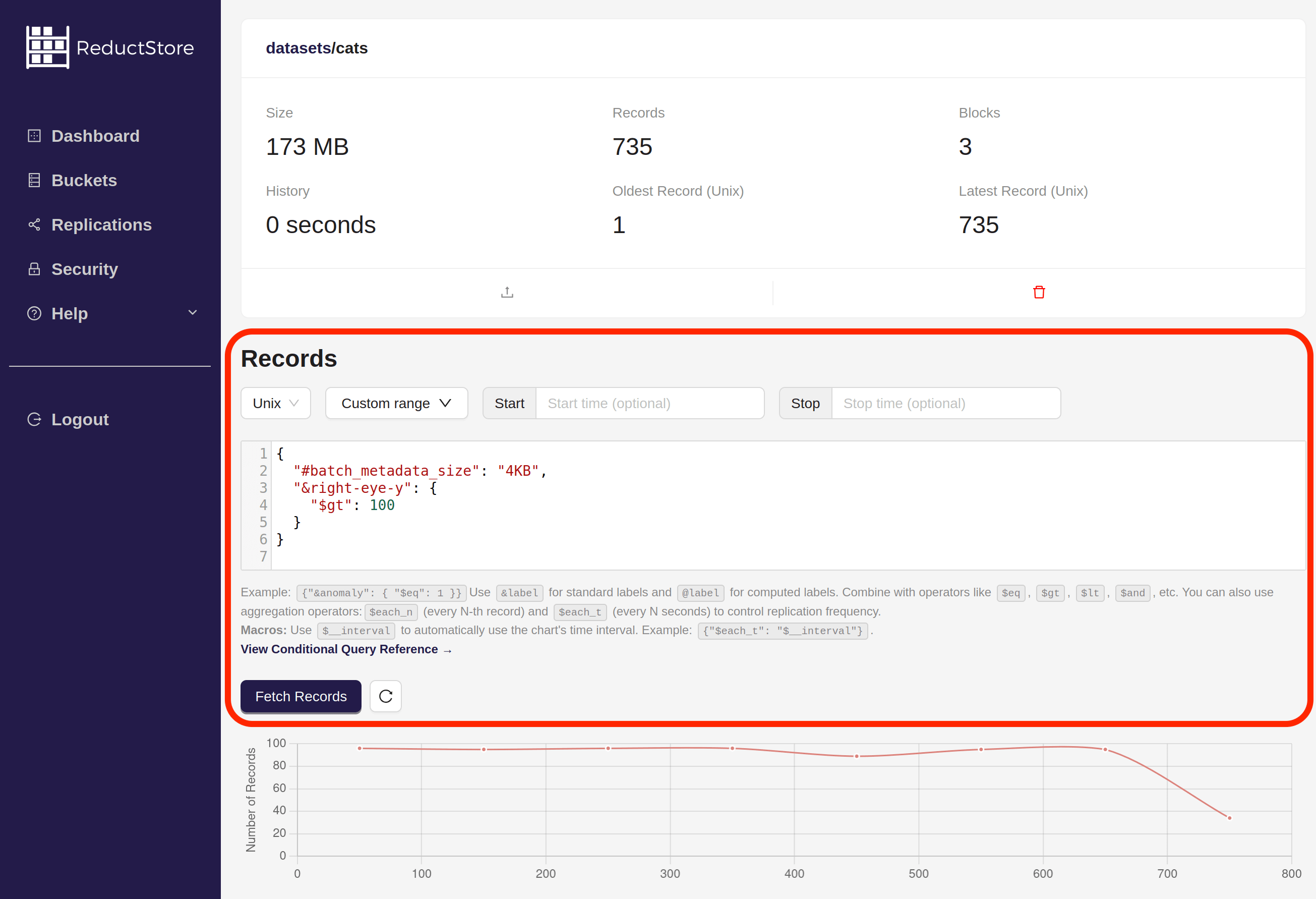
- Enter the time range in the date picker or manually in the input fields
- Click the Fetch Records button to execute the query
- You will see the meta information about the records that match the time range.
- Click on the + icon in the record row to open the edit panel:
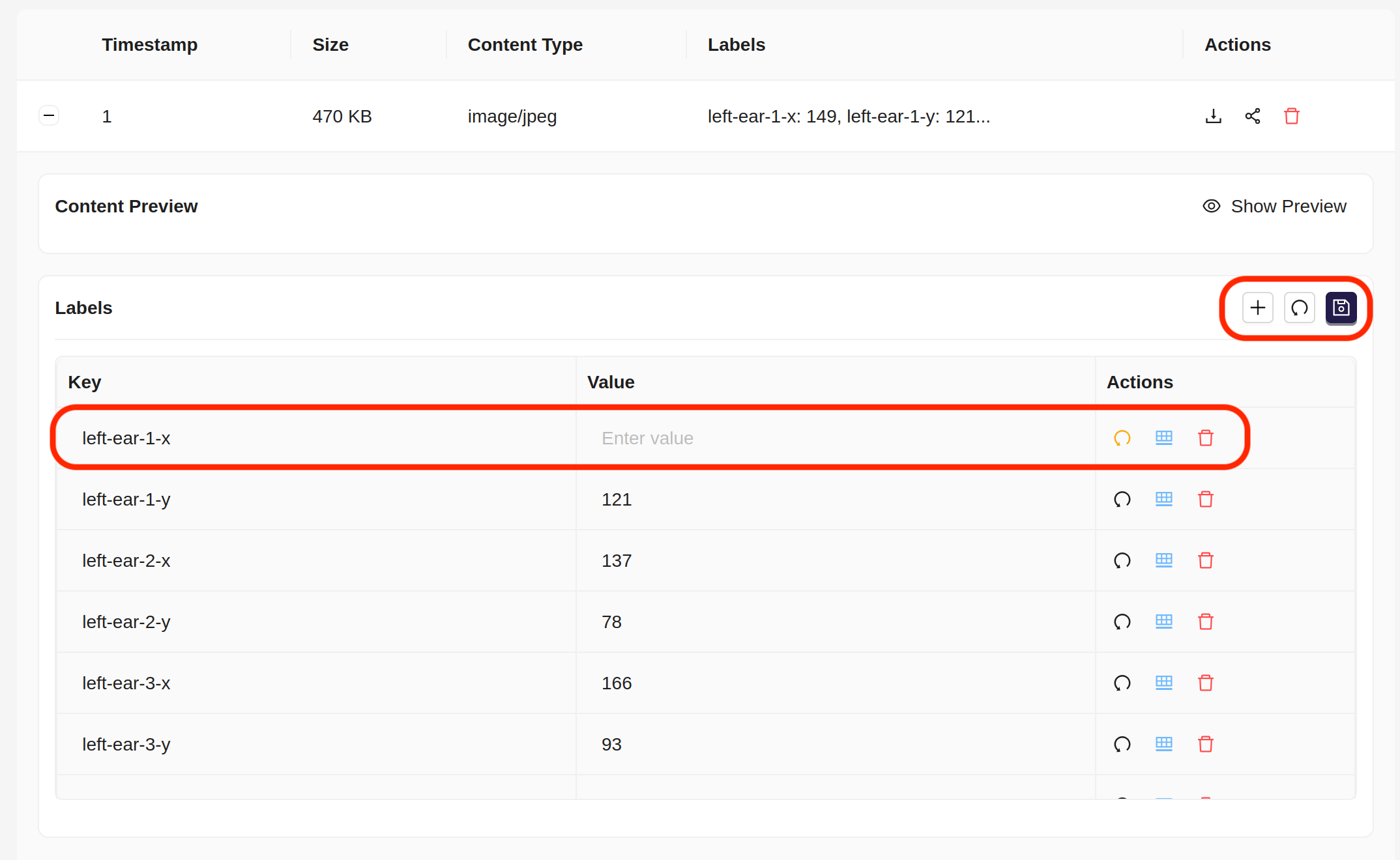
- In the edit panel you can add, remove or update labels for the record.
- Click on the Save icon to save the changes.
#!/bin/bash
set -e -x
API_PATH="http://127.0.0.1:8383/api/v1"
AUTH_HEADER="Authorization: Bearer my-token"
# Send a record with labels a
TIME=`date +%s000000`
curl -d "Some binary data" \
-H "${AUTH_HEADER}" \
-H "x-reduct-label-key1: value1" \
-H "x-reduct-label-key2: value2" \
-H "Content-Type: plain/text" \
-X POST -a ${API_PATH}/b/example-bucket/entry_1?ts=${TIME}
# Update the "key1" label to "new_value1" and remove the "key2" label
curl -H "${AUTH_HEADER}" \
-H "x-reduct-label-key1: new_value1" \
-H "x-reduct-label-key2: " \
-X PATCH -a ${API_PATH}/b/example-bucket/entry_1/labels
Deleting Data
The ReductStore API allows you to delete specific records from an entry, an entire entry, or an entire bucket. You can do this using the Client SDKs, the Reduct CLI, or the HTTP API.
Deleting Entry or Bucket
The following examples show how to delete the entire entry or the entire bucket:
- CLI
- Web Console
- Python
- JavaScript
- Go
- Rust
- C++
- cURL
reduct-cli alias add local -L http://localhost:8383 -t "my-token"
# Delete only entry with name "example-entry"
reduct-cli bucket rm local/bucket-to-remove --only-entries example-entry
# Wait for the storage to finish removing blocks
sleep 1
# Delete entire bucket without confirmation
reduct-cli bucket rm local/bucket-to-remove -y
- Open the Web Console at
http://127.0.0.1:8383in your browser. - Enter the API token if the authorization is enabled.
- Select a bucket that you want to delete or that contains an entry to be deleted:
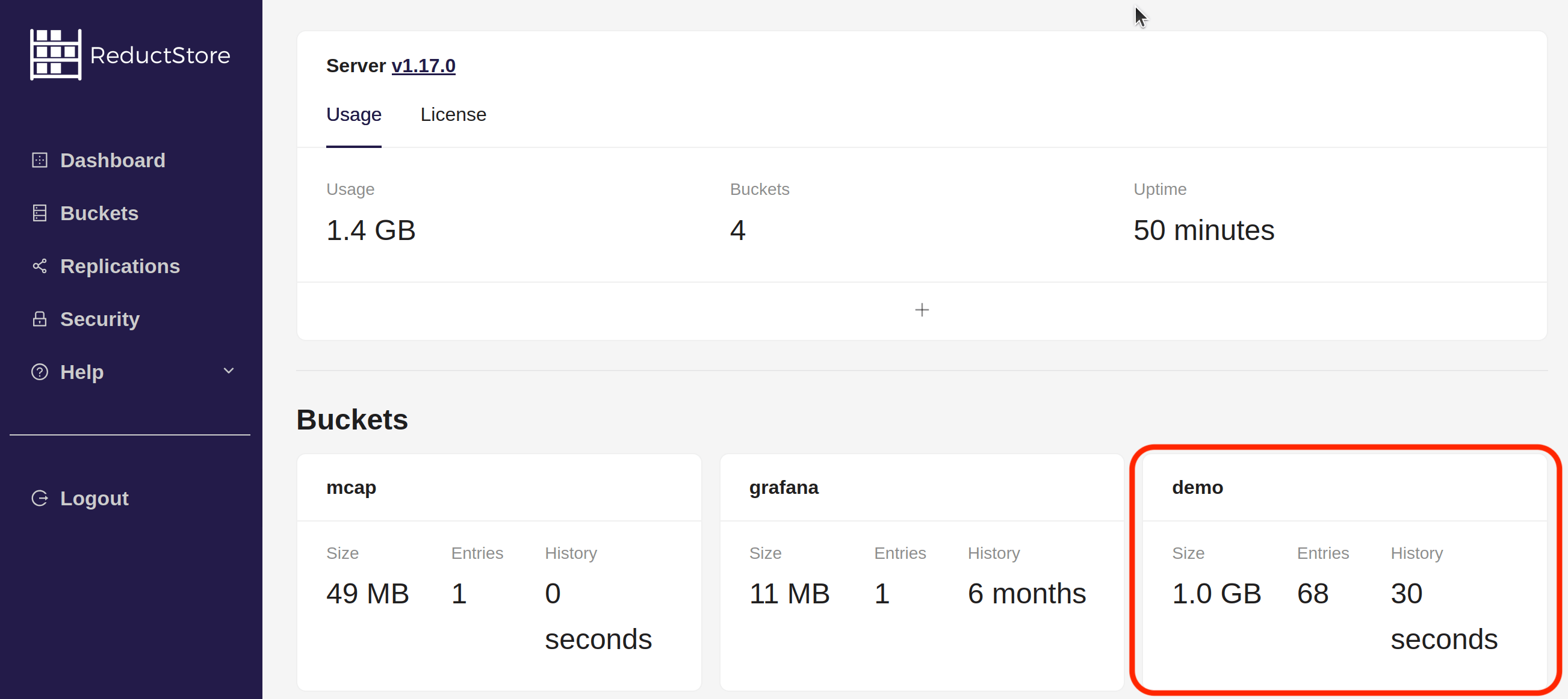
- You will see a list of all the entries in the bucket
- To delete the entire bucket, click on the red bin icon in the bucket panel. If you want to delete an entry, click on the red bin icon in the entry row:
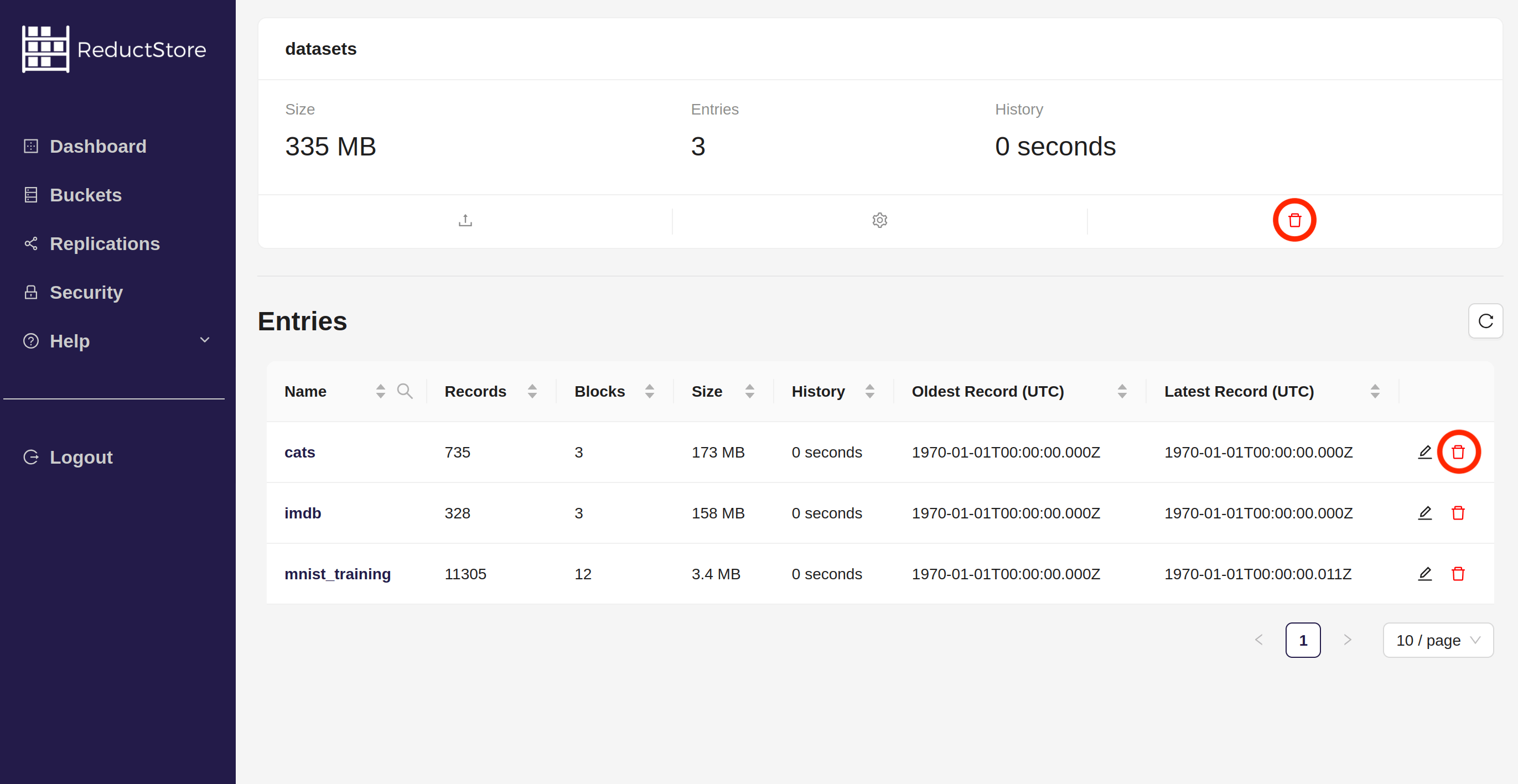
- Then confirm the deletion by typing the bucket or entry name and clicking on the Remove button:
import asyncio
from reduct import Client, Bucket
async def main():
# Create a client with the base URL and API token
async with Client("http://localhost:8383", api_token="my-token") as client:
# Get bucket to remove
bucket: Bucket = await client.get_bucket("bucket-to-remove")
# Delete only entry with name "example-entry"
await bucket.remove_entry("example-entry")
# Wait for the storage to finish removing blocks
await asyncio.sleep(1)
# Remove entire bucket
await bucket.remove()
if __name__ == "__main__":
asyncio.run(main())
import { Client } from "reduct-js";
import assert from "node:assert";
// Create a new client with the server URL and an API token
const client = new Client("http://127.0.0.1:8383", { apiToken: "my-token" });
// Get bucket to remove
const bucket = await client.getBucket("bucket-to-remove");
// Delete only entry with name "example-entry"
await bucket.removeEntry("example-entry");
// Wait for the storage to finish removing blocks
await new Promise((resolve) => setTimeout(resolve, 1000));
// Remove entire bucket
await bucket.remove();
package main
import (
"context"
reduct "github.com/reductstore/reduct-go"
"time"
)
func main() {
// Create a client and use the base URL and API token
client := reduct.NewClient("http://localhost:8383", reduct.ClientOptions{
APIToken: "my-token",
})
// Get bucket to remove
bucket, err := client.GetBucket(context.Background(), "bucket-to-remove")
if err != nil {
panic(err)
}
// Remove only entry with name "example-entry"
err = bucket.RemoveEntry(context.Background(), "example-entry")
if err != nil {
panic(err)
}
// Wait for the storage to finish removing blocks
time.Sleep(1 * time.Second)
// Remove entire bucket
err = bucket.Remove(context.Background())
if err != nil {
panic(err)
}
}
use reduct_rs::{ReductClient, ReductError};
use tokio::time::{sleep, Duration};
#[tokio::main]
async fn main() -> Result<(), ReductError> {
// Create a new client with the API URL and API token
let client = ReductClient::builder()
.url("http://127.0.0.1:8383")
.api_token("my-token")
.build();
// Get bucket to remove
let bucket = client.get_bucket("bucket-to-remove").await?;
// Delete only entry with name "example-entry"
bucket.remove_entry("example-entry").await?;
// Wait for the storage to finish removing blocks
sleep(Duration::from_secs(1)).await;
// Remove entire bucket
bucket.remove().await?;
Ok(())
}
#include <reduct/client.h>
#include <cassert>
#include <chrono>
#include <iostream>
#include <thread>
using reduct::IBucket;
using reduct::IClient;
using reduct::Error;
int main() {
// Create a client with the server URL
auto client = IClient::Build("http://127.0.0.1:8383", {
.api_token = "my-token"
});
// Get bucket to remove
auto [bucket, get_err] = client->GetBucket("bucket-to-remove");
assert(get_err == Error::kOk);
// Delete only entry with name "example-entry"
auto remove_entry_err = bucket->RemoveEntry("example-entry");
assert(remove_entry_err == Error::kOk);
// Wait for the storage to finish removing blocks
std::this_thread::sleep_for(std::chrono::seconds(1));
// Remove entire bucket
auto remove_err = bucket->Remove();
assert(remove_err == Error::kOk);
}
#!/bin/bash
set -e -x
API_PATH="http://127.0.0.1:8383/api/v1"
AUTH_HEADER="Authorization: Bearer my-token"
# Delete only entry with name "example-entry"
curl -X DELETE \
-H "${AUTH_HEADER}" \
-a "${API_PATH}"/b/bucket-to-remove/example-entry
# Wait for the storage to finish removing blocks
sleep 1
# Delete entire bucket
curl -X DELETE \
-H "${AUTH_HEADER}" \
-a "${API_PATH}"/b/bucket-to-remove
Pay attention that removing a bucket doesn't remove it immediately. The bucket is marked as DELETING, and the cleanup continues in the background. During this time, you cannot access the bucket or its entries. Once the deletion is complete, the bucket and all its data are permanently removed from the store.
Deleting Specific Records
You can remove a single record from an entry or a set of records by specifying their timestamps.
- CLI
- Web Console
- Python
- Go
- JavaScript
- Rust
- C++
- cURL
reduct-cli alias add local -L http://localhost:8383 -t "my-token"
# Delete records with the specified timestamps
reduct-cli rm local/example-bucket --entries cats --time 10 20
- Open the Web Console at
http://127.0.0.1:8383in your browser. - Enter the API token if the authorization is enabled.
- Select the bucket that contains the data you want to query:

- You will see a list of all the entries in the bucket
- Click on the entry you want to query
- On the entry page you will see the query panel:

- Enter the time range in the date picker or manually in the input fields
- Click the Fetch Records button to execute the query
- Click on the Delete icon next to the record you want to delete:
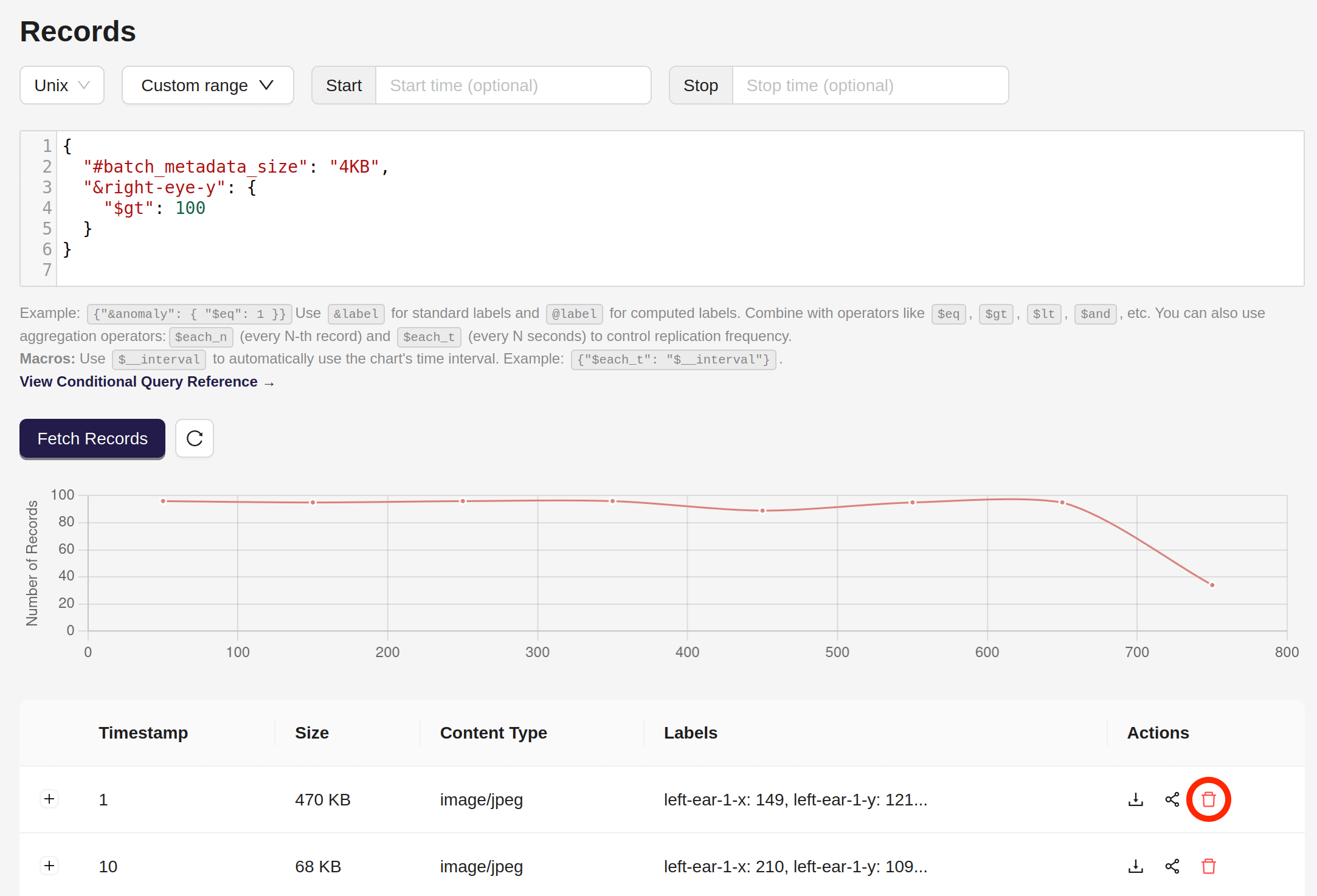
from time import time
from reduct import Client, Bucket, Batch
async def main():
# Create a client with the base URL and API token
async with Client("http://localhost:8383", api_token="my-token") as client:
bucket: Bucket = await client.create_bucket("my-bucket", exist_ok=True)
# Send some records to the "py-example"
ts = time()
await bucket.write(
"py-example",
b"Some binary data",
ts
)
await bucket.write(
"py-example",
b"Some binary data",
ts + 1
)
# Delete a single record
await bucket.remove_record("py-example", ts)
# Delete a batch of records
batch = Batch()
batch.add(ts) # already deleted, so this error will be in the errors map
batch.add(ts + 1)
errors = await bucket.remove_batch("py-example", batch)
assert len(errors) == 1
print(errors)
if __name__ == "__main__":
import asyncio
asyncio.run(main())
package main
import (
"context"
reduct "github.com/reductstore/reduct-go"
"time"
)
func main() {
// Create a client and use the base URL and API token
client := reduct.NewClient("http://localhost:8383", reduct.ClientOptions{
APIToken: "my-token",
})
// Get or create a bucket with the name "my-bucket"
bucket, err := client.CreateOrGetBucket(context.Background(), "my-bucket", nil)
if err != nil {
panic(err)
}
// Send some records to the "go-example"
ts := time.Now().UnixMicro()
err = bucket.BeginWrite(context.Background(), "go-example", &reduct.WriteOptions{
Timestamp: ts,
}).Write([]byte("Some binary data"))
if err != nil {
panic(err)
}
err = bucket.BeginWrite(context.Background(), "go-example", &reduct.WriteOptions{
Timestamp: ts + 1,
}).Write([]byte("Some binary data"))
if err != nil {
panic(err)
}
// Delete a single record
err = bucket.RemoveRecord(context.Background(), "go-example", ts)
if err != nil {
panic(err)
}
// Delete a batch of records
batch := bucket.BeginRemoveBatch(context.Background(), "go-example")
// Add the timestamp of the already deleted record
batch.AddOnlyTimestamp(ts) // already deleted, so this error will be in the errors map
batch.AddOnlyTimestamp(ts + 1)
errors, err := batch.Write(context.Background())
if err != nil {
panic(err)
}
if len(errors) != 1 {
panic("Expected 1 error, but got " + string(len(errors)))
}
for ts, err := range errors {
println("Error deleting record with timestamp", ts, ":", err.Error())
}
}
import { Client } from "reduct-js";
import assert from "node:assert";
// Create a client instance, then get or create a bucket
const client = new Client("http://127.0.0.1:8383", { apiToken: "my-token" });
const bucket = await client.getOrCreateBucket("bucket");
// Send some records to the "entry-1" entry
const timestamp = BigInt(Date.now()) * 1000n;
let record = await bucket.beginWrite("entry-1", timestamp);
await record.write("Some binary data");
record = await bucket.beginWrite("entry-1", timestamp + 1000_000n);
await record.write("Some more binary data");
// Delete a single record
await bucket.removeRecord("entry-1", timestamp);
// Delete a batch of records
const batch = await bucket.beginRemoveBatch("entry-1");
batch.addOnlyTimestamp(timestamp); // already deleted, so this error will be in the errors map
batch.addOnlyTimestamp(timestamp + 1000_000n);
const errors = await batch.write();
assert(errors.size === 1);
console.log(errors);
use std::time::{Duration, SystemTime};
use bytes::Bytes;
use reduct_rs::{ErrorCode, ReductClient, ReductError};
use tokio;
#[tokio::main]
async fn main() -> Result<(), ReductError> {
// Create a client instance, then get or create a bucket
let client = ReductClient::builder()
.url("http://127.0.0.1:8383")
.api_token("my-token")
.build();
let bucket = client.create_bucket("test").exist_ok(true).send().await?;
// Send some records to the "rs-example" entry
let timestamp = SystemTime::now();
bucket
.write_record("rs-example")
.timestamp(timestamp)
.data(Bytes::from("Some binary data"))
.send()
.await?;
bucket
.write_record("rs-example")
.timestamp(timestamp + Duration::from_secs(1))
.data(Bytes::from("Some more binary data"))
.send()
.await?;
// Delete a single record
bucket
.remove_record("rs-example")
.timestamp(timestamp)
.send()
.await?;
// Delete a batch of records
let batch = bucket.remove_batch("rs-example");
let errors = batch
.add_timestamp(timestamp) // was already deleted, so this error will be in the errors map
.add_timestamp(timestamp + Duration::from_secs(1))
.send()
.await?;
assert_eq!(errors.len(), 1);
assert_eq!(errors.values().next().unwrap().status, ErrorCode::NotFound);
Ok(())
}
#include <reduct/client.h>
#include <cassert>
#include <chrono>
using reduct::IBucket;
using reduct::IClient;
using reduct::Error;
using std::chrono_literals::operator ""s;
int main() {
// Create a client instance, then get or create a bucket
auto client = IClient::Build("http://127.0.0.1:8383", {.api_token="my-token"});
auto [bucket, create_err] = client->GetOrCreateBucket("my-bucket");
assert(create_err == Error::kOk);
// Send some records to the "cpp-example"
IBucket::Time ts = IBucket::Time::clock::now();
auto err = bucket->Write("cpp-example", ts, [](auto rec) {
rec->WriteAll("Some binary data");
});
assert(err == Error::kOk);
err = bucket->Write("cpp-example", ts + 1s, [](auto rec) {
rec->WriteAll("Some binary data");
});
assert(err == Error::kOk);
// Delete a single record
err = bucket->RemoveRecord("cpp-example", ts);
assert(err == Error::kOk);
// Delete a batch of records
auto [record_errors, http_err] = bucket->RemoveBatch("cpp-example", [ts](auto batch) {
batch->AddRecord(ts); // Already deleted, so this error will be in the errors map
batch->AddRecord(ts + 1s);
});
assert(http_err == Error::kOk);
assert(record_errors.begin()->second.code == 404);
return 0;
}
#!/bin/bash
set -e -x
API_PATH="http://127.0.0.1:8383/api/v1"
AUTH_HEADER="Authorization: Bearer my-token"
# Write a record
TIME=`date +%s000000`
curl -d "Some binary data" \
-H "${AUTH_HEADER}" \
-H "Content-Type: plain/text" \
-X POST -a ${API_PATH}/b/example-bucket/entry_1?ts=${TIME}
# Delete a single record
curl -H "${AUTH_HEADER}" \
-X DELETE -a ${API_PATH}/b/example-bucket/entry_1?ts=${TIME}
Deleting Records in a Time Range
You can delete records in a specific time range by specifying the start and end timestamps, and you can use query parameters to filter the records:
| Parameter | Description | Type | Default |
|---|---|---|---|
start | Remove records from | Timestamp | The timestamp of the first record in the entry |
stop | Remove records until | Timestamp | The timestamp of the last record in the entry |
when | Condition, remove a record when it is true | JSON-like object | No condition |
All the listed parameters are the same as the query parameters for the query method. Read more about the querying data in the Querying Data guide.
The following examples show how to delete records in a specific time range:
- CLI
- Python
- JavaScript
- Go
- Rust
- C++
- cURL
#!/bin/bash
set -e -x
reduct-cli alias add local -L http://localhost:8383 -t "my-token"
# Delete all records from timestamp 10 to 20
reduct-cli rm local/example-bucket --entries entry_1 --start 10 --stop 20
# You can also delete all records with a specific label
reduct-cli rm local/example-bucket --entries entry_1 --when '{"&key1": {"$eq": "value1"}}'
# Or each N-th record
reduct-cli rm local/example-bucket --entries entry_1 --each-n 2
from time import time
from reduct import Client, Bucket, Batch
async def main():
# Create a client with the base URL and API token
async with Client("http://localhost:8383", api_token="my-token") as client:
bucket: Bucket = await client.create_bucket("my-bucket", exist_ok=True)
# Send some records to the "py-example"
ts = time()
await bucket.write(
"py-example",
b"Some binary data",
ts
)
await bucket.write(
"py-example",
b"Some binary data",
ts + 1
)
# Delete all records within a time range
removed_records = await bucket.remove_query("py-example", ts, ts + 2)
assert removed_records == 2
# You can also delete all records with a specific label
await bucket.remove_query("py-example", ts, ts + 2, when={"&key1": {"$eq": "value1"}})
# Or each second record in a time range
await bucket.remove_query("py-example", ts, ts + 2, when={"$each_n": 2})
if __name__ == "__main__":
import asyncio
asyncio.run(main())
import { Client } from "reduct-js";
import assert from "node:assert";
// Create a client instance, then get or create a bucket
const client = new Client("http://127.0.0.1:8383", { apiToken: "my-token" });
const bucket = await client.getOrCreateBucket("bucket");
// Send some records to the "entry-1" entry
const timestamp = BigInt(Date.now()) * 1000n;
let record = await bucket.beginWrite("entry-1", timestamp);
await record.write("Some binary data");
record = await bucket.beginWrite("entry-1", timestamp + 1000_000n);
await record.write("Some more binary data");
// Delete all records withing a time range
const removedRecords = await bucket.removeQuery(
"entry-1",
timestamp,
timestamp + 2000_000n,
);
assert(removedRecords === 2);
// You can also delete all records with a specific label
await bucket.removeQuery("entry-1", undefined, undefined, {
when: { "&key1": { $eq: "value1" } },
});
// Or each second record
await bucket.removeQuery("entry-1", undefined, undefined, {
when: { $each_n: 2 },
});
package main
import (
"context"
reduct "github.com/reductstore/reduct-go"
"time"
)
func main() {
// Create a client and use the base URL and API token
client := reduct.NewClient("http://localhost:8383", reduct.ClientOptions{
APIToken: "my-token",
})
// Get or create a bucket with the name "my-bucket"
bucket, err := client.CreateOrGetBucket(context.Background(), "my-bucket", nil)
if err != nil {
panic(err)
}
// Send some records to the "go-example"
ts := time.Now().UnixMicro()
err = bucket.BeginWrite(context.Background(), "go-example", &reduct.WriteOptions{
Timestamp: ts,
}).Write([]byte("Some binary data"))
if err != nil {
panic(err)
}
err = bucket.BeginWrite(context.Background(), "go-example", &reduct.WriteOptions{
Timestamp: ts + 1,
}).Write([]byte("Some binary data"))
if err != nil {
panic(err)
}
// Delete all records within a time range
queryRequest := &reduct.QueryOptions{
Start: ts,
Stop: ts + 2,
}
removedRecords, err := bucket.RemoveQuery(context.Background(), "go-example", queryRequest)
if err != nil {
panic(err)
}
if removedRecords != 2 {
panic("Expected to remove 2 records, but got " + string(removedRecords))
}
// You can also delete all records with a specific label
_, err = bucket.RemoveQuery(context.Background(), "go-example", &reduct.QueryOptions{
Start: ts,
Stop: ts + 2,
When: map[string]any{"&key1": map[string]any{"$eq": "value1"}},
})
if err != nil {
panic(err)
}
// Or each second record in a time range
_, err = bucket.RemoveQuery(context.Background(), "go-example", &reduct.QueryOptions{
Start: ts,
Stop: ts + 2,
When: map[string]any{"$each_n": 2},
})
if err != nil {
panic(err)
}
}
use std::time::{Duration, SystemTime};
use bytes::Bytes;
use reduct_rs::{condition, ReductClient, ReductError};
use tokio;
#[tokio::main]
async fn main() -> Result<(), ReductError> {
// Create a client instance, then get or create a bucket
let client = ReductClient::builder()
.url("http://127.0.0.1:8383")
.api_token("my-token")
.build();
let bucket = client.create_bucket("test").exist_ok(true).send().await?;
// Send some records to the "rs-example" entry
let timestamp = SystemTime::now();
bucket
.write_record("rs-example")
.timestamp(timestamp)
.data(Bytes::from("Some binary data"))
.send()
.await?;
bucket
.write_record("rs-example")
.timestamp(timestamp + Duration::from_secs(1))
.data(Bytes::from("Some more binary data"))
.send()
.await?;
// Delete all records within a time range
let removed_records = bucket
.remove_query("rs-example")
.start(timestamp)
.stop(timestamp + Duration::from_secs(2))
.send()
.await?;
assert_eq!(removed_records, 2);
// You can also delete all records with a specific label
bucket
.remove_query("rs-example")
.when(condition!({"&key1": {"$eq": "value1"}}))
.send()
.await?;
// Or each second record
bucket.remove_query("rs-example").when(condition!({
"$each_n": 2
})).send().await?;
Ok(())
}
#include <reduct/client.h>
#include <cassert>
#include <chrono>
using reduct::IBucket;
using reduct::IClient;
using reduct::Error;
using std::chrono_literals::operator ""s;
int main() {
// Create a client instance, then get or create a bucket
auto client = IClient::Build("http://127.0.0.1:8383", {.api_token="my-token"});
auto [bucket, create_err] = client->GetOrCreateBucket("my-bucket");
assert(create_err == Error::kOk);
// Send some records to the "cpp-example"
IBucket::Time ts = IBucket::Time::clock::now();
auto err = bucket->Write("cpp-example", ts, [](auto rec) {
rec->WriteAll("Some binary data");
});
assert(err == Error::kOk);
err = bucket->Write("cpp-example", ts + 1s, [](auto rec) {
rec->WriteAll("Some binary data");
});
assert(err == Error::kOk);
// Delete all records withing a time range
auto [removed_records, query_err] = bucket->RemoveQuery("cpp-example", ts, ts + 2s, {});
assert(query_err == Error::kOk);
assert(removed_records == 2);
// You can also delete all records with a specific label
bucket->RemoveQuery("cpp-example", {}, {},{
.when = R"({"&key1": {"$eq": "value1"}}))"
});
// Or each second record
bucket->RemoveQuery("cpp-example", {}, {},{
.when = R"({"$each_n": 2})"
});
}
#!/bin/bash
set -e -x
API_PATH="http://127.0.0.1:8383/api/v1"
AUTH_HEADER="Authorization: Bearer my-token"
# Write a record
TIME=`date +%s000000`
curl -d "Some binary data" \
-H "${AUTH_HEADER}" \
-H "Content-Type: plain/text" \
-X POST -a ${API_PATH}/b/example-bucket/entry_1?ts=${TIME}
# Delete all records from TIME
curl -H "${AUTH_HEADER}" \
-d '{"query_type": "DELETE", "start": "'${TIME}'"}' \
-X POST -a ${API_PATH}/b/example-bucket/entry_1/q
# You can also delete all records with a specific label
curl -H "${AUTH_HEADER}" \
-d '{"query_type": "DELETE", "when": {"&key1": {"$eq": "value1"}}' \
-X POST -a ${API_PATH}/b/example-bucket/entry_1/q
# Or each second record
curl -H "${AUTH_HEADER}" \
-d '{"query_type": "DELETE", "when": {"$each_n: 2"}}' \
-X POST -a ${API_PATH}/b/example-bucket/entry_1/q
Starting with version 1.18, you can also remove records across multiple entries by providing the 'entry' parameter with a list of entry names or a wildcard pattern.
Deleting records in a time range is a heavy operation and may take a long time to complete because it copies the retained records to new blocks and deletes the old ones.
Renaming Entries
An entry can be renamed using the SDKs, CLI client, Web Console, or REST API. A client must have write permission to a bucket to rename its entries if the authorization is enabled.
- CLI
- Web Console
- Python
- JavaScript
- Go
- Rust
- C++
- cURL
#!/bin/bash
set -e -x
reduct-cli alias add local -L http://localhost:8383 -t "my-token"
# Rename the entry entry_1 to entry_2 in the bucket example-bucket
reduct-cli bucket rename --only-entry entry_1 local/example-bucket entry_2
- Open the Web Console at
http://127.0.0.1:8383in your browser. - Enter the API token if the authorization is enabled.
- Select the bucket that contains the entry you want to rename:

- You will see a list of all the entries in the bucket
- Click on the edit icon in the entry row:
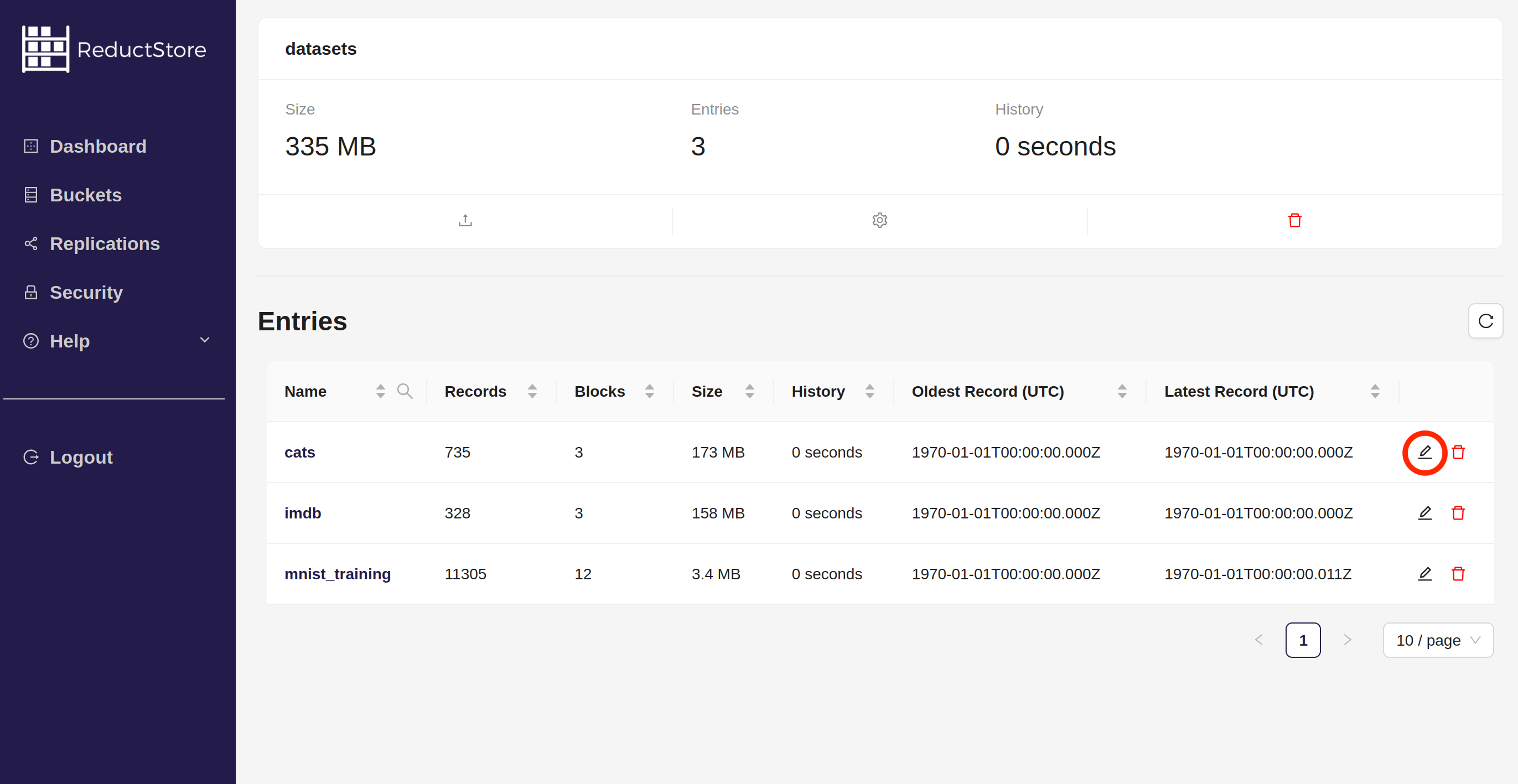
- Rename the entry and click on the Save button:
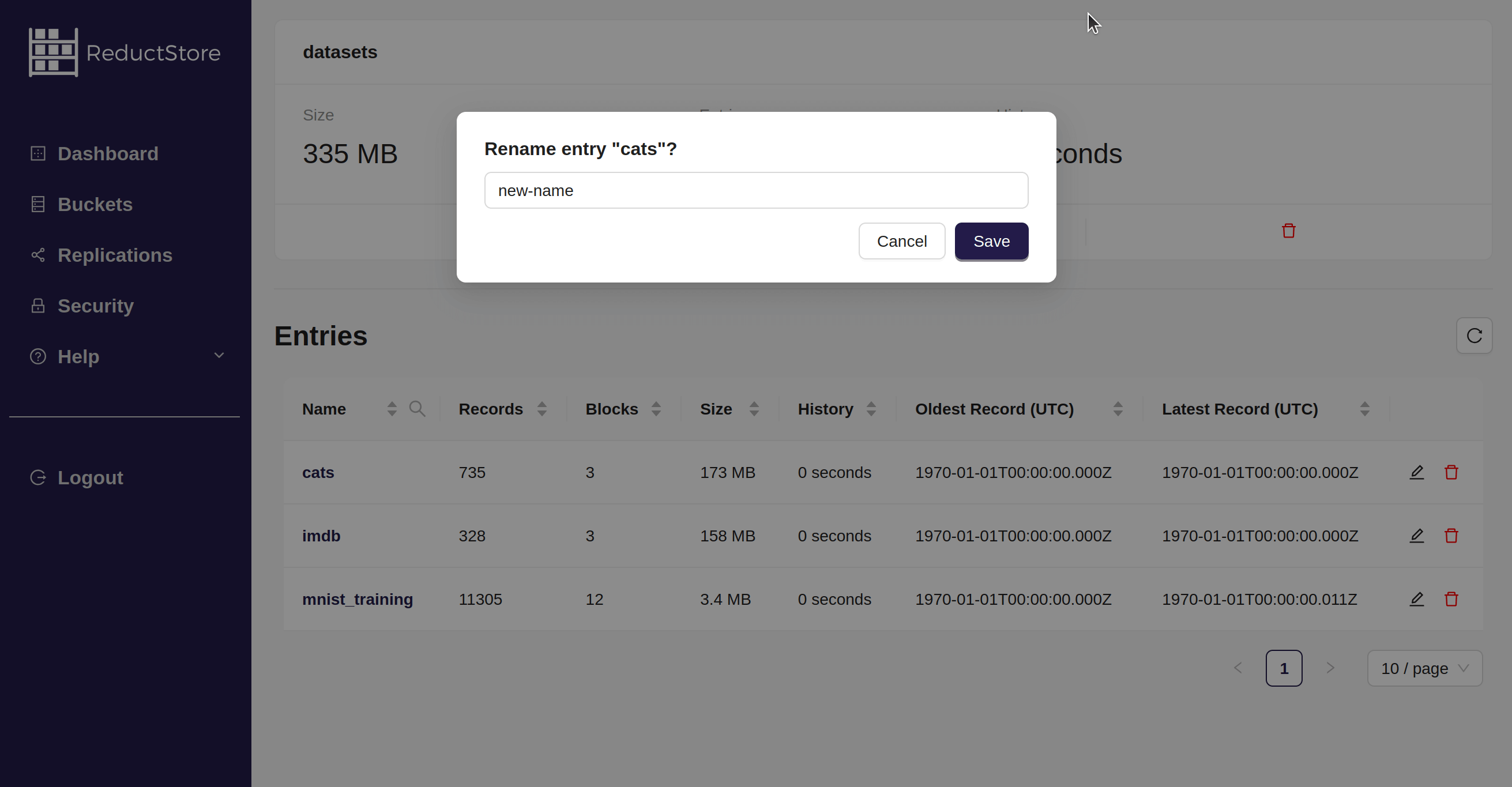
from reduct import Client
async def rename_entry():
# Create a client with the base URL and API token
async with Client("http://127.0.0.1:8383", api_token="my-token") as client:
# Get the bucket with the name "example-bucket"
bucket = await client.get_bucket("example-bucket")
# Rename the entry "entry_1" to "entry_2"
await bucket.rename_entry("entry_1", "entry_2")
# Check that the entry was renamed
entries = await bucket.get_entry_list()
entry_names = [entry.name for entry in entries]
assert "entry_2" in entry_names
assert "entry_1" not in entry_names
if __name__ == "__main__":
import asyncio
asyncio.run(rename_entry())
import { Client } from "reduct-js";
import assert from "node:assert";
// Create a new client with the server URL and an API token
const client = new Client("http://127.0.0.1:8383", { apiToken: "my-token" });
// Get the bucket 'example-bucket'
const bucket = await client.getBucket("example-bucket");
// Rename the entry 'entry_1' to 'entry_2'
await bucket.renameEntry("entry_1", "entry_2");
// Check that the entry was renamed
const entries = (await bucket.getEntryList()).map((entry) => entry.name);
assert(entries.includes("entry_2"));
assert(!entries.includes("entry_1"));
package main
import (
"context"
reduct "github.com/reductstore/reduct-go"
)
func main() {
// Create a client and use the base URL and API token
client := reduct.NewClient("http://localhost:8383", reduct.ClientOptions{
APIToken: "my-token",
})
// Get or create a bucket with the name "my-bucket"
bucket, err := client.CreateOrGetBucket(context.Background(), "example-bucket", nil)
if err != nil {
panic(err)
}
// Rename the entry "entry_1" to "entry_2"
err = bucket.RenameEntry(context.Background(), "entry_1", "entry_2")
if err != nil {
panic(err)
}
// Check that the entry was renamed
entries, err := bucket.GetEntries(context.Background())
if err != nil {
panic(err)
}
entryNames := make([]string, len(entries))
for i, entry := range entries {
entryNames[i] = entry.Name
}
}
use reduct_rs::{ReductClient, ReductError};
use tokio;
#[tokio::main]
async fn main() -> Result<(), ReductError> {
// Create a new client with the API URL and API token
let client = ReductClient::builder()
.url("http://127.0.0.1:8383")
.api_token("my-token")
.build();
// Get the bucket 'example-bucket'
let bucket = client.get_bucket("example-bucket").await?;
// Rename the entry 'entry_1' to 'entry_2'
bucket.rename_entry("entry_1", "entry_2").await?;
// Check that the entry was renamed
let entries = bucket.entries().await?;
let entry_names: Vec<&str> = entries.iter().map(|entry| entry.name.as_str()).collect();
assert!(entry_names.contains(&"entry_2"));
assert!(!entry_names.contains(&"entry_1"));
Ok(())
}
#include <reduct/client.h>
#include <iostream>
#include <cassert>
using reduct::IBucket;
using reduct::IClient;
using reduct::Error;
int main() {
// Create a client with the server URL
auto client = IClient::Build("http://127.0.0.1:8383", {
.api_token = "my-token"
});
// Get the bucket with the name "example-bucket"
auto [bucket, get_err] = client->GetBucket("example-bucket");
assert(get_err == Error::kOk);
// Rename the entry with the name "entry_1" to "entry_2"
auto rename_err = bucket->RenameEntry("entry_1", "entry_2");
assert(rename_err == Error::kOk);
// Check that the old entry name no longer exists
auto [entry_list, get_err2] = bucket->GetEntryList();
assert(get_err2 == Error::kOk);
assert(std::find_if(entry_list.begin(), entry_list.end(), [](const IBucket::EntryInfo& entry) {
return entry.name == "entry_1";
}) == entry_list.end());
// Check that the new entry name exists
assert(std::find_if(entry_list.begin(), entry_list.end(), [](const IBucket::EntryInfo& entry) {
return entry.name == "entry_2";
}) != entry_list.end());
}
#!/bin/bash
set -e -x
API_PATH="http://127.0.0.1:8383/api/v1"
AUTH_HEADER="Authorization: Bearer my-token"
curl -X PUT \
-H "${AUTH_HEADER}" \
-a "${API_PATH}/b/example-bucket/entry_1/rename" \
-H "Content-Type: application/json" \
-d '{"new_name": "entry_2"}'